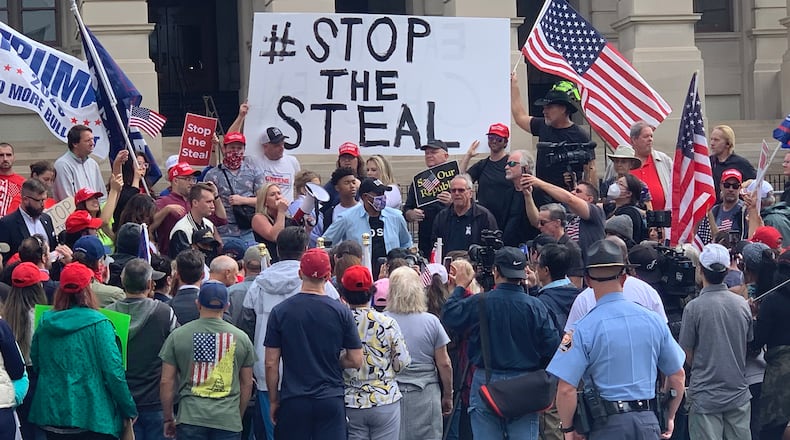One of the most important speeches of 2021 was hardly noticed when it happened.
It came from Atlanta City Council President Felicia Moore. Standing in front of a bank of television cameras on the night of the Atlanta mayoral runoff in November, Moore told her supporters that she had lost the election and Andre Dickens had won.
“The campaign is over,” she said.
The wide margin made Moore’s concession easy to anticipate. But after an entire year of watching leaders refuse to accept Georgia election results, especially in Fulton County, her speech was an example of what we used to know as normal behavior.
“You had a vision in your head of something that did not materialize. But I just believe that things work in perfect order,” she said. “There’s a reason for this.”
And with that, the race was over. No claims of fraud. No demands for a “forensic audit.” No allegations of dead people voting. Or out-of-state interlopers. Or burning ballots. Or stuffed suitcases. Just a dignified concession and permission for her supporters to accept defeat.
Compare that to the entire last year in Georgia with Donald Trump and his supporters conducting a full-throttle campaign to deny, undermine, and overturn the 2020 election.
Let me add here that every candidate has the right to challenge an election. But they also need proof to make their case.
As the AJC’s independent reporting has repeatedly shown, including the latest investigation on the election’s aftermath, Donald Trump has never, ever produced valid proof, not one example, to back up his claims there was fraud in the 2020 election.
In fact, the opposite is true.
The AJC project shows that one by one, every investigator and judge who has given the former president a hearing has also rejected his claims.
Donald Trump’s former Attorney General William Barr found no fraud.
His U.S. Attorney in Atlanta, BJ Pak, found no fraud.
The U.S. Supreme Court rejected both lawsuits alleging fraud.
GBI and state investigators have found no fraud.
State and federal judges who heard lawsuits alleging fraud variously called the evidence submitted by Trump’s attorneys and allies “highly inaccurate,” “wildly unreliable,” political “grandstanding,” “judicial activism,” and “worthless.”
After a state judge ruled there was “no evidence” to back up Trump supporters’ claims of irregularities, Trump allies touted those allegations in Atlanta anyway without ever adding the rest of the story — that a judge had just reviewed the allegations and thrown them out.
At a certain point, the AJC investigation also shows that the former president went from claiming the election was stolen to trying to overturn the results himself, often with the help of local Georgia officials.
Sunday will mark the one-year anniversary of the extraordinary phone call from Trump to Georgia Secretary of State Brad Raffensperger and his team, when the then-president said, “Fellas, I need 11,000 votes. Give me a break.”
Among the many wild accusations and theories that Trump floated on that call was a claim that he knew of thousands of dead people who voted in Georgia.
“I think the number is close to 5,000 people,” Trump said.
But a year-long state investigation has now shown that just four dead people’s votes were cast in the election, all sent in by relatives doing what they said their loved ones would have wanted. Those four families now face punishment by the Georgia Attorney General’s office.
Even as each case of alleged fraud or impropriety from Trump has been investigated and dismissed, his constant attacks on Georgia’s elections have had real-world consequences nonetheless.
Election workers and their relatives have been targeted and threatened. The Georgia General Assembly passed an entire election overhaul in the name of election integrity.
Roughly three-fourths of GOP voters in Georgia told AJC pollsters they didn’t trust the outcome of the last election. Hundreds of Trump supporters attacked the U.S. Capitol on Jan. 6th because they believed in Trump.
All because the former president, who lost the election, won’t also say that he never had proof for the claims he made.
In 2022, there will be an entire pro-Trump slate of Republicans running in primaries on “election integrity.” But the great irony of that term is that the biggest obstacle to the integrity of the 2020 election has been Trump’s refusal to tell the truth to his supporters — that the campaign is over. That they had a vision in their heads of something that did not materialize, and that he lost.
If anybody might have cried foul in 2021, it could have been Felicia Moore, who won 41% of the vote on Election Night, but lost by a landslide to Dickens just three weeks later.
Hers was also the largest election in the state since the Georgia General Assembly passed a new law requiring identification to vote absentee and shortening the deadline to return absentee ballots.
And it took place largely in Fulton County, which Trump and his supporters have claimed is incapable of executing a valid election.
But the election had no allegations of impropriety and, crucially, it had integrity in Moore’s voters’ minds, not because of what Dickens said on Election Night, but because of what she said.
Dickens will be sworn into office on Monday with no cloud of suspicion hanging over him. Atlantans can meet their new mayor and evaluate his administration based on the quality of his leadership — not the doubts of his legitimacy.
That is how democracy is supposed to work.
About the Author
Keep Reading
The Latest
Featured



